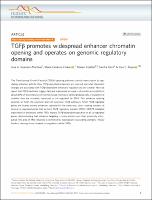Resum
Paraules clau
Cromatina; Informàtica del genoma; Transcripció
Citació recomanada
Guerrero-Martínez JA, Ceballos-Chávez M, Koehler F, Peiró S, Reyes JC. TGFβ promotes widespread enhancer chromatin opening and operates on genomic regulatory domains. Nat Commun. 2020 Dec 3;11:6196.
Audiència
Professionals
Empreu aquest identificador per citar i/o enllaçar aquest document
https://hdl.handle.net/11351/6268Aquest element apareix a les col·leccions següents
Els següents fitxers sobre la llicència estan associats a aquest element:

